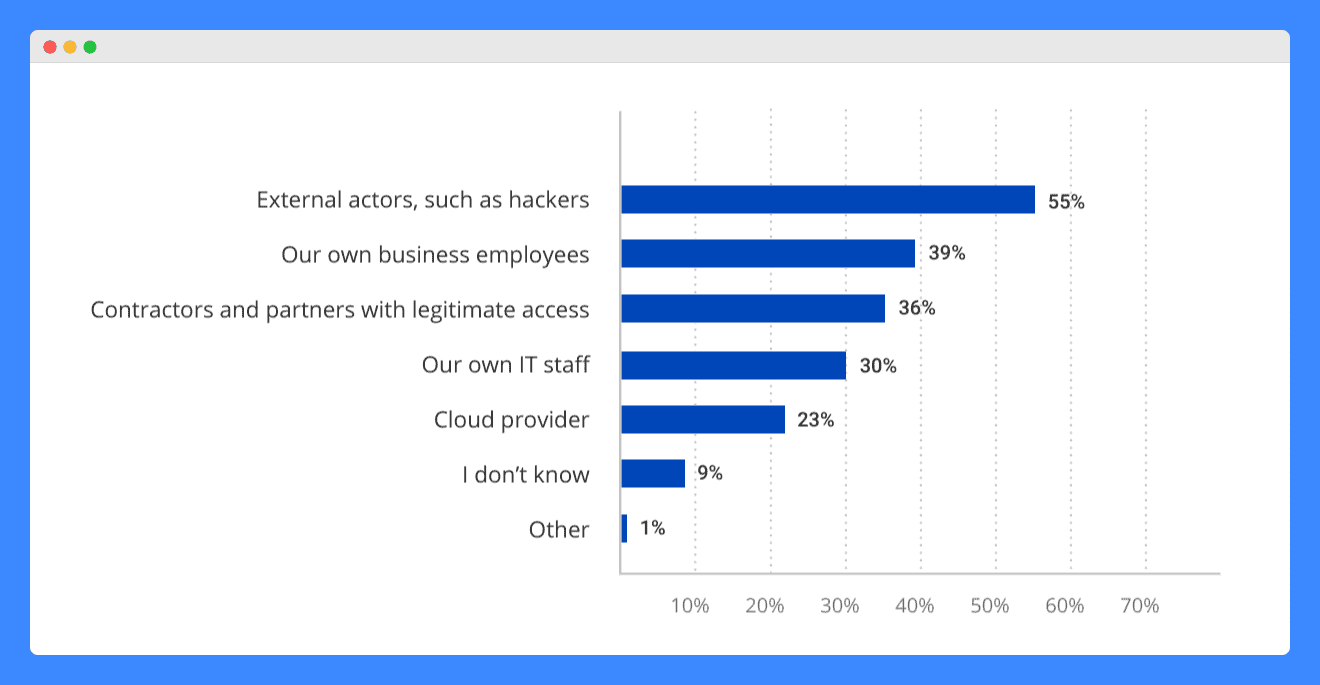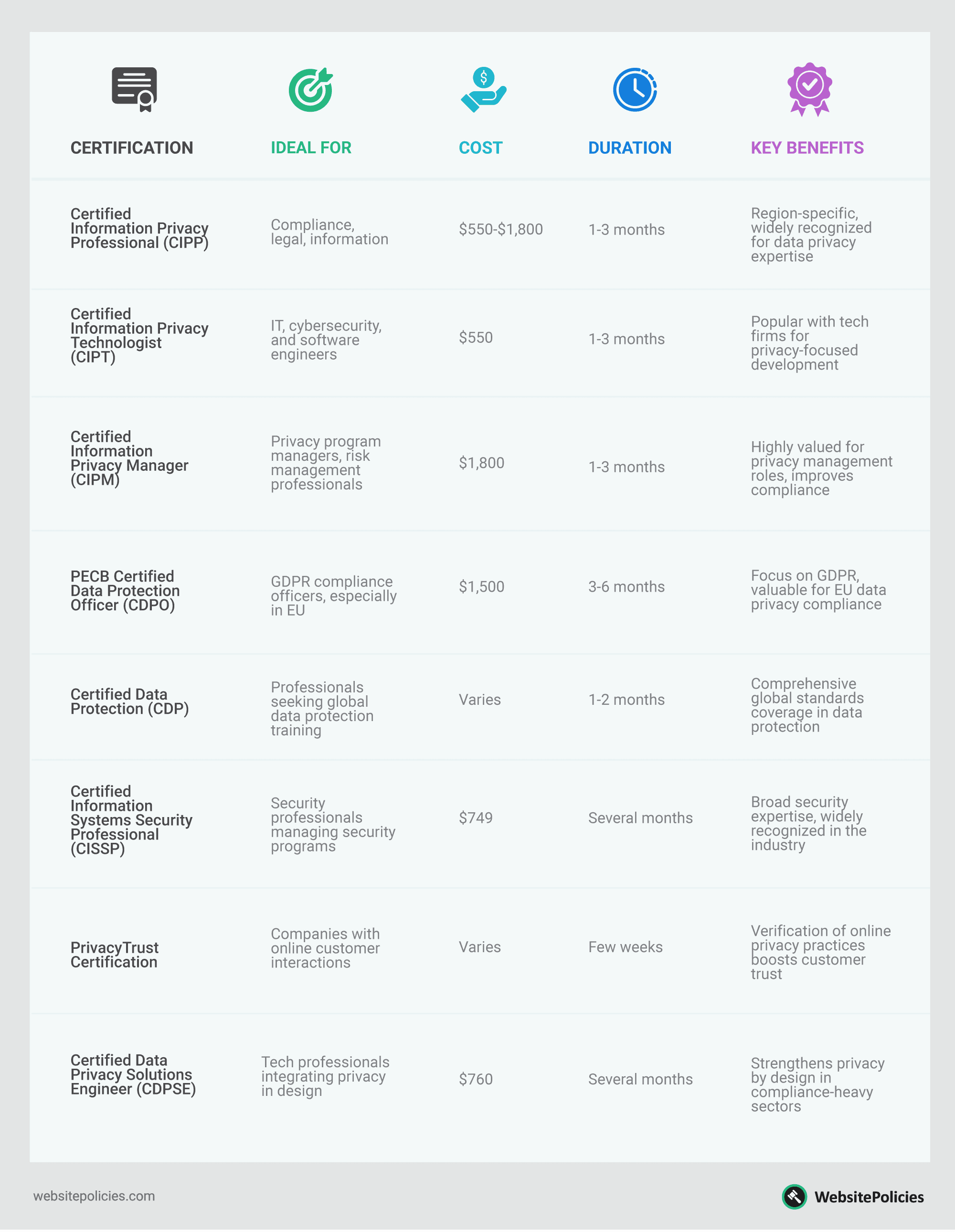Personal data has become one of the most valuable assets, making data protection more critical than ever for professionals and businesses alike.
But how do you prove that you prioritize data privacy in an industry where trust is hard to earn? Without the right credentials, it’s difficult to demonstrate your commitment.
That’s where data privacy certifications come into play. These certifications serve as concrete evidence that you not only understand the importance of protecting sensitive information but also adhere to top industry standards.
Below, I’ll walk you through the most recognized data privacy certifications and how you can achieve them.
- Data privacy certifications validate essential knowledge and practical skills, helping professionals stay competitive and compliant.
- Earning certifications like CIPP, CIPT, or CIPM enhances career opportunities and positions individuals as privacy experts.
- Continuing privacy education through certifications can open doors to advanced roles and career growth in privacy-focused positions.
Table of Contents
PRO TIP: Save time & money with the professional generators trusted by over 200,000 businesses and create essential legal policies personalized to your needs in minutes.
8 Data Privacy Certifications to Consider
If data privacy is a priority, earning a well-recognized data protection certification can help you demonstrate your expertise and build trust in your professional network.
Here’s a breakdown of the top certifications, who they’re best suited for, and how to earn them.
1. Certified Information Privacy Professional (CIPP)
Offered by the International Association of Privacy Professionals (IAPP), CIPP is ideal for professionals involved in data protection, legal compliance, and information management.
This certification is region-specific, covering areas such as the U.S. (CIPP/US), Canada (CIPP/C), Europe (CIPP/E), and Asia (CIPP/A), which makes it adaptable for professionals working in global privacy contexts.
- How to Get Certified: Complete IAPP training and pass a 2.5-hour, 90-question exam. Training options include self-study guides or in-person sessions.
- Cost and Timeframe: Fees range from $550 to $1,800, with certification achievable in 1-3 months.
Many law firms and corporate legal departments find that having CIPP-certified professionals enhances their ability to navigate complex regulations like General Data Protection Regulation (GDPR), thus boosting their credibility and reducing potential risks.
The American Bar Association has even supported CIPP certification as a means to build specialist credentials, such as the Privacy Law Specialist designation.
2. Certified Information Privacy Technologist (CIPT)
Tailored for IT and cybersecurity professionals, CIPT from IAPP equips tech experts to address privacy and data protection in development and design.
- How to Get Certified: Pass a 90-question exam, with preparatory resources available online or in person.
- Cost and Timeframe: Exam fees are about $550, with optional training available.
In tech-driven roles, having CIPT certification can set you apart by showcasing your ability to integrate privacy considerations into technology solutions.
PRO TIP: CIPT is especially beneficial if you’re applying for roles in cybersecurity or IT product development, as it highlights your ability to prioritize privacy in complex digital environments.
This is particularly valuable given that 55% of professionals in a recent Netwrix survey cited hackers as the top data privacy threat, underscoring the need for strong information security and privacy safeguards.

3. Certified Information Privacy Manager (CIPM)
The CIPM, also offered by IAPP, is perfect for those focused on managing and building privacy programs within an organization.
- How to Get Certified: Complete the IAPP’s training and pass a 90-question exam centered on privacy program management.
- Cost and Timeframe: Certification costs around $550 to $1,800, including training, and typically takes a few months.
Privacy managers in large tech companies, financial institutions, and healthcare organizations often find that this certification strengthens their ability to implement comprehensive data privacy frameworks.
4. PECB Certified Data Protection Officer (CDPO)
The Professional Evaluation and Certification Board (PECB) CDPO certification focuses on GDPR compliance and is ideal for Europe-based companies.
- How to Get Certified: Requires five years in data protection, a qualifying exam, and adherence to ethical standards.
- Cost and Timeframe: Certification can cost up to $1,500, typically taking 3-6 months.
This certification empowers professionals to effectively navigate GDPR requirements and build strong data privacy strategies.
If GDPR compliance is your primary goal, the CDPO certification provides specialized knowledge and practical application skills.
5. Certified Data Protection (CDP)
From the Identity Management Institute, CDP covers international security standards and privacy laws.
- How to Get Certified: Candidates must be members, pass an exam, and complete training modules.
- Cost and Timeframe: Costs vary, with certification possible within 1-2 months.
The CDP certification helps professionals understand data privacy and apply global data protection laws. This strengthens practices from data collection to disposal.
Personally, I find it helpful to engage in webinars or online workshops focused on international privacy law updates to complement your CDP training and broaden your understanding.
6. Certified Information Systems Security Professional (CISSP)
Provided by The International Information Systems Security Certification Consortium (ISC)², the CISSP certification goes beyond just data privacy to cover broader security principles and protocols. It’s a fit for professionals involved in designing and managing security programs.
- How to Get Certified: Requires five years of experience in information security and a six-hour exam.
- Cost and Timeframe: The exam fee is $749, with several months typically needed for preparation.
CISSP-certified professionals often work in senior roles, like Chief Information Security Officers (CISOs) or senior IT consultants, to help organizations protect sensitive data and avoid breaches.
7. PrivacyTrust Certification
PrivacyTrust audits company practices, granting certification to companies that meet privacy standards for online interactions.
- How to Get Certified: Businesses undergo an audit to evaluate privacy practices, with annual renewals.
- Cost and Timeframe: Costs vary, with certification generally completed within a few weeks.
This certification signals a professional’s dedication to strong data privacy measures, which is particularly valuable for those working in sectors where handling significant personal data transfers is common.
8. Certified Data Privacy Solutions Engineer (CDPSE)
The Information Systems Audit and Control Association’s (ISACA) CDPSE is targeted at tech professionals who integrate privacy into system designs, making it especially beneficial for those in highly regulated industries like finance.
- How to Get Certified: Requires five years of experience and an exam after training.
- Cost and Timeframe: Costs around $760 and generally takes several months.
CDPSE-certified experts are valued for their ability to embed privacy considerations into every stage of product development, which ensures compliance with international data protection laws and practices.
Differences Between Data Privacy Certifications
Choosing the right data privacy certification depends on your professional role, industry, and career goals.
With so many options available, it’s important to identify which certification aligns best with your specific needs, whether you’re working in cybersecurity, healthcare, or focused on compliance with regulations like GDPR.
Below is a comparison of top data privacy certifications, highlighting their target audiences, costs, completion times, and key benefits to help you make an informed decision.

Benefits of Getting Certified in Data Privacy
When it comes to data privacy, certifications aren’t just an impressive line on a resume, they’re a powerful asset that can transform careers and enhance business operations.
The following are key ways in which being certified in data protection practices enhances expertise and career prospects for professionals:
- Validated Knowledge and Skills: Certifications prove that you have the knowledge and skills needed to navigate complex data privacy regulations and practices. This validation is necessary when working in high-stakes environments where data protection is non-negotiable.
- Increased Confidence: Earning a certification can boost your confidence and improve your ability to perform well in your job. This assurance stems from knowing you have been formally trained and tested on industry best practices.
- Increased Job Opportunities: With data breaches making headlines and affecting industries worldwide, companies are more vigilant than ever about data security. Holding a respected certification can set you apart and make you a more competitive candidate for roles that require specialized privacy expertise.
- Expanded Professional Network: Pursuing certifications can connect you with other professionals in the industry who may become valuable contacts or future colleagues. Networking opportunities provided by global training and certification programs and related events can open doors to career growth and collaboration.
- Keeping Up with Industry Standards: Data privacy laws and regulations evolve rapidly. Certifications typically require ongoing education and recertification, ensuring that your knowledge remains up-to-date. This adaptability is essential for maintaining relevance and effectiveness in your field.
- Competitive Compensation: Being certified in data privacy often comes with the benefit of higher compensation. Certified professionals are recognized for their specialized expertise, which makes them valuable assets in the job market. In fact, CISSP was ranked as one of the 15 top-paying IT certifications in 2019.
Benefits of Using Certified Experts for Your Business
If you’re a business owner, here’s why investing in certified data privacy professionals can make all the difference for your company.
- Demonstrated Expertise: Hiring certified data privacy professionals signals that your team has undergone thorough training and possesses verified skills. This ensures your organization has knowledgeable personnel capable of managing complex data protection scenarios.
- Improved Compliance and Security Posture: Certified professionals bring proven methodologies to your data privacy framework, helping you adhere to regulations like GDPR or the California Consumer Privacy Act (CCPA). This proactive approach can prevent costly fines and safeguard your organization’s reputation.
- Ethical and Legal Data Use: Certified professionals are well-versed in ensuring that your company uses customer data legally and ethically. This helps avoid regulatory pitfalls and reinforces your business’s commitment to responsible data management.
- Enhanced Client Confidence: Prioritizing certified experts communicates to clients and partners that their data is managed by skilled professionals. This commitment builds trust and encourages client loyalty.
- Competitive Advantage: Employing certified data privacy professionals sets you apart in industries where data security is a priority. In industries where data protection is a major concern, showcasing a skilled team can differentiate your business from competitors.
- Proactive Data Protection: Certified experts are equipped with the skills to counteract data protection issues like identity theft or fraud, significantly strengthening your company’s overall security framework.
PRO TIP: Periodic renewal through continuing education keeps professionals up-to-date with new regulations, cybersecurity threats, and solutions. For businesses, this translates to a workforce ready to tackle new challenges with current knowledge.
Frequently Asked Questions
Why do businesses need data privacy-certified professionals?
Businesses need data privacy-certified professionals to ensure strong compliance, reduce risks, and protect their reputations. These experts apply proven knowledge to safeguard data and maintain trust with clients.
What are the benefits of data privacy certifications?
They enhance your understanding of data protection laws, make you more credible, and improve your career opportunities in privacy-focused roles.
How does a certification help in compliance?
Certifications verify that you have the expertise to adhere to data privacy regulations, minimizing risks and boosting your professional reliability.
What is the cost range for data privacy certifications?
Costs typically range from $550 to $1,800, depending on the certification and preparation required.
How do certifications provide a competitive edge?
Certified individuals stand out to employers and clients, especially in sectors where data security is critical, like healthcare, finance, and tech.

